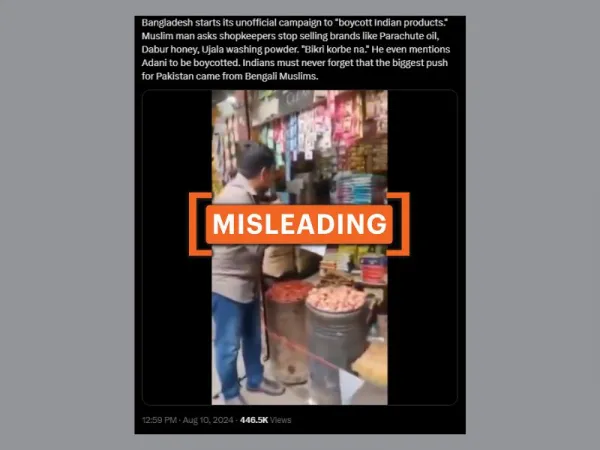By: Chandan Borgohain
August 20 2024
 Social media posts have misrepresented an old video from February 2024 as a recent ‘boycott Indian products’ campaign in Bangladesh. (Source: X/Modified by Logically Facts)
Social media posts have misrepresented an old video from February 2024 as a recent ‘boycott Indian products’ campaign in Bangladesh. (Source: X/Modified by Logically Facts)
The video predates the formation of Bangladesh's new interim government and depicts a ‘boycott’ campaign by a political party from February 2024.
What is the claim?
A video circulating widely on social media shows a man walking through a market in Bangladesh, urging shopkeepers not to sell Indian products. The over-six-minute video features the individual distributing leaflets and advocating for the boycott of Indian goods, saying in Bengali, “We are on a campaign to boycott Indian products.”
The video has been shared with the claim that it reflects a recent effort by Bangladesh's newly formed interim government to ban Indian products.
An X (formerly Twitter) user shared the video (archived here) with the caption in Hindi, “The new government of Bangladesh has started its official campaign to 'boycott Indian products.' BNP leaders are visiting cities and asking shopkeepers to stop selling Indian products like Parachute Oil, Dabur Honey, and Ujala Washing Powder. They also called for a boycott of Adani. The Indian government should now understand that Bangladesh is emerging as a bigger threat than Pakistan on our eastern borders. Bangladesh should be responded to in its own language (translated from Hindi)."
Another X user shared the video (archived here) with a similar caption, adding that "Indians must not forget that the biggest push for Pakistan came from Bengali Muslims." The post has garnered over 446,000 views, more than 6,200 likes, and 4,000 reshares. The video is also viral on Facebook with similar claims (archived versions can be found here and here).
Screenshots of social media posts sharing the viral video. (Source: X/Screenshot/Modified by Logically Facts)
However, our investigation revealed that the video predates the formation of the interim government in Bangladesh and depicts a campaign by the political party ‘Gono Odhikar Parishad’ from February 2024.
What did we find?
A reverse image search of a keyframe from the video (archived here) revealed that it was first shared on a Facebook page named Tamanna Ferdous Shikha (archived here) on February 22, 2024. The caption in Bengali translates to, “Went to the shops and warned them not to sell Indian products.”
Tamanna Ferdous Shikha is associated with the political party ‘Gono Odhikar Parishad’. Another Facebook account linked to Shikha identifies her as a “Senior Assistant Convener” of the party.
We reviewed Shikha’s Facebook page and found videos of the person in the viral video. In one video (archived here), the person, identified as Tarek Rahman, is seen delivering a public speech with a placard in the background reading ‘Gono Odhikar Parishad.'
Tarek Rahman, as seen in the viral video and a Facebook video. (Source: X/Facebook/Screenshots)
Further investigation led us to a Facebook page named Tarek/Gono Odhikar Parishad. In a live video (archived here) shared on March 5, 2024, Rahman is seen in a similar brown shirt as in the viral video, distributing leaflets and urging people to boycott Indian products.
On February 19, 2024, Rahman posted (archived here) a leaflet listing Indian products and their Bangladeshi alternatives, citing reasons for the boycott, including alleged killings of Bangladeshi citizens by Indian Border Security Force (BSF) soldiers, political and economic aggression by India, and India’s alleged interference in Bangladesh’s elections.
The video was also uploaded on Rahman’s YouTube channel, ‘Tarek’s Time,’ on February 22, 2024 (archived here). The Bengali title translates to, “I am going to shops and warning them not to keep any Indian products.”
Screenshot of the video uploaded on Tarek Rahman’s YouTube channel. (Source: YouTube/Screenshot)
This evidence confirms that the viral video predates the formation of the interim government, which took place on August 8, 2024.
Boycott India campaign in Bangladesh
According to a March 15, 2024, report by The Diplomat, the ‘India Out’ campaign gained traction in Bangladesh after the January 2024 general election, where the Awami League, led by Sheikh Hasina, secured a fourth term. The campaign emerged amid allegations that India supported the Awami League’s election manipulation. The Diplomat noted that the campaign reflects discontent over both the Awami League's election tactics and India’s perceived indifference to democratic backsliding in Bangladesh.
Al Jazeera and Bangladeshi news outlet Prothom Alo also reported on the boycott calls and the Gono Odhikar Parishad’s campaign against Indian products in February 2024.
Current unrest in Bangladesh
According to a PTI report, nearly 650 people were killed in Bangladesh between July 16 and August 11 due to unrest that began with student protests and evolved into broader anti-government demonstrations. Former Prime Minister Hasina resigned on August 5, leading to the formation of an interim government under Nobel laureate Muhammad Yunus on August 8. Yunus’s first major address on August 18 included promises for free and fair elections and support for the Rohingya community.
The verdict
The viral video predates the recent unrest in Bangladesh and has been online since February 2024. It does not represent a measure adopted or led by the recent interim government. Social media users have incorrectly attributed the video to recent government actions.